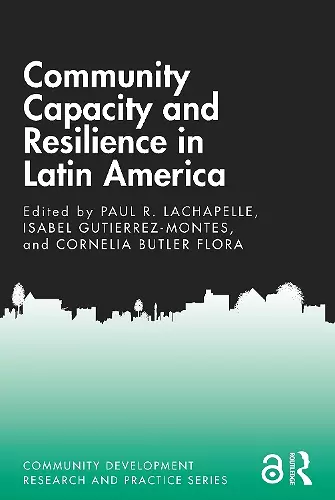Community Capacity and Resilience in Latin America
Cornelia Butler Flora editor Isabel Gutierrez-Montes editor Paul R Lachapelle editor
Format:Hardback
Publisher:Taylor & Francis Ltd
Published:9th Jul '20
Currently unavailable, and unfortunately no date known when it will be back
This hardback is available in another edition too:
- Paperback£37.99(9781138084902)

Community Capacity and Resilience in Latin America addresses the role of communities in building their capacity to increase resiliency and carry out rural development strategies in Latin America. Resiliency in a community sense is associated with an ability to address stress and respond to shock while obtaining participatory engagement in community assessment, planning and outcome. Although the political contexts for community development have changed dramatically in a number of Latin American countries in recent years, there are growing opportunities and examples of communities working together to address common problems and improve collective quality of life.
This book links scholarship that highlights community development praxis using new frameworks to understand the potential for community capacity and resiliency. By rejecting old linear models of development, based on technology transfer and diffusion of technology, many communities in Latin America have built capacity of their capital assets to become more resilient and adapt positively to change. This book is an essential resource for academics and practitioners of rural development, demonstrating that there is much we can learn from the skills of self-diagnosis and building on existing assets to enhance community capitals.
Chapter 3 of this book is freely available as a downloadable Open Access PDF at http://www.taylorfrancis.com under a Creative Commons Attribution (CC-BY) 4.0 license.
"Community Capacity and Resilience in Latin America speaks to the power of local communities as agents of change. From local farmers, to university students, to indigenous leaders, to youth, this book describes how communities can collectively build from their own cultural, natural, social and political capital to create a better world. While financial capital runs rampant over the world, this book tells another story - of how communities across Latin America use their own community capitals to create a different alternative. Bio-cultural and sustainable approaches, grounded in indigenous knowledge and inclusion of women and youth, show how to address agricultural, energy, economic and employment challenges in rural communities."
—Mildred E. Warner, Professor, Department of City and Regional Planning, Cornell University
"This is an excellent volume using the Community Capitals Framework to address critical socioeconomic, cultural, and ecological issues. Presenting a diverse array of authors, the book contributes to theory and fine-grained case studies at multiple scales from communities to international institutions. It covers important topics such as climate change and adaptation, resilience and quality of life, gender equity and social inclusion, the role of churches and faith-rooted organizations in community change initiatives, and rural livelihoods and food security. The book will be useful to practitioners, policy-makers, scholars, and students alike, including the very experienced and those just learning about Latin America and some of the topics presented here."
—Maria Elisa Christie, Director, Women and Gender in International Development, Center for International Research, Education and Development, Virginia Tech
"Agricultural and rural communities across the world face many challenges, not least to produce food sustainably, mitigate against climate change, and ensure there are fair markets for their produce. This timely, wise and scholarly book highlights the values of social capital in community development and shows how resilience emerges from processes of engagement and progressive transformation."
—Jules Pretty, Professor of Environment & Society, School of Life Sciences, University of Essex
"Latin America is a large and diverse area that is home to 630 million people. It is an area of tremendous opportunity, yet significant challenges. This book is an excellent resource to help communities throughout the region overcome obstacles and bring prosperity to more communities and individuals."
—Don Albrecht, Executive Director, Western Rural Development Center
ISBN: 9781138084896
Dimensions: unknown
Weight: 453g
202 pages